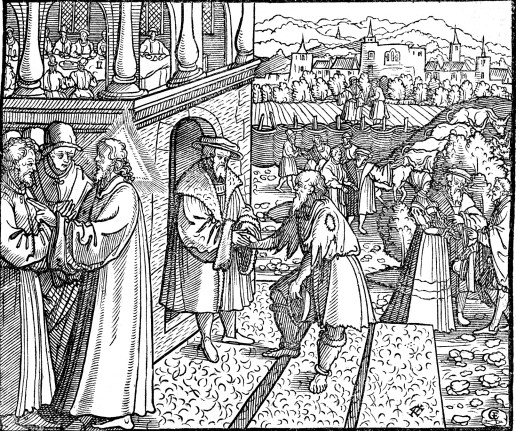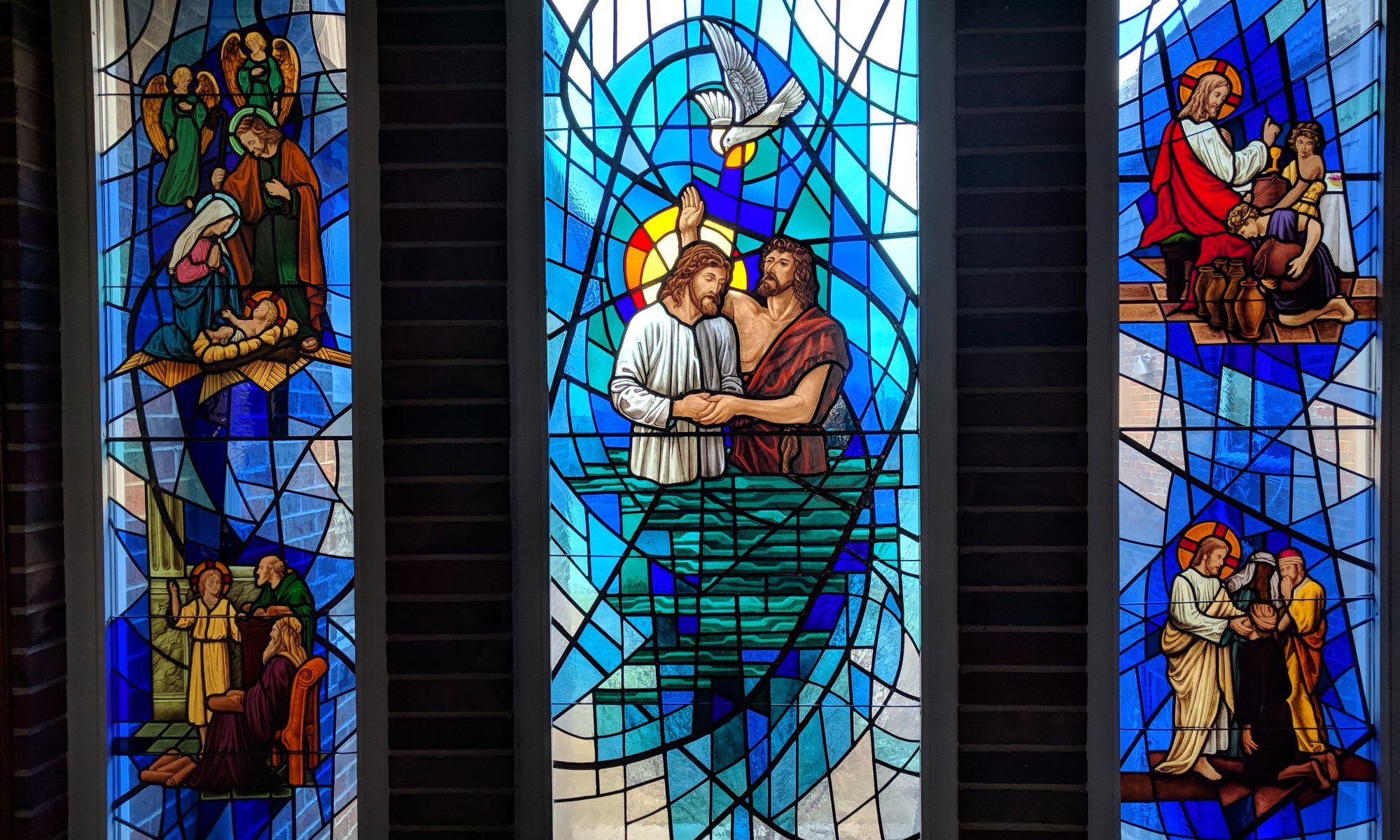
Lessons: Proverbs 9:1-10, 1 John 3:13-18, Luke 14:15-24
Hymns: LSB 904, 510, 622, 696, 683
Grace, mercy, and peace to you from God our Father and our Lord and Savior, Jesus Christ. Amen
Beloved in the Lord, when St. John wrote, “By this we know love, that he laid down his life for us” (1 John 3:16), he echoed the words of Jesus. Jesus said, “Greater love has no one than this, that someone lay down his life for his friends. You are my friends” (John 15:13-14). Jesus laid down His life for you. He died on the cross for you—to forgive you, to save you, and to give you eternal life.
As today’s Gospel indicates, this gift of salvation is available for everyone. In the Parable of the Great Supper, Jesus speaks of a man who throws a huge banquet and invited many people. But those invited made excuses and were unwilling to come. Undeterred, the man sends his servants out to invite anyone they can find—the poor and the maimed and the lame and the blind. After doing this, there’s still room, so the master sends his servants out yet again, telling them to bring in the homeless and anyone they can find. No one is excluded from the invitation.
That’s how the Gospel works. No one is excluded from the Gospel call. Jesus is the Lamb of God who takes away the sin of the world (John 1:29). When Jesus went to the cross, He didn’t just pay for the sins of those who would be saved; He paid for all people’s sin throughout all history. So when you see a homeless person, know that Jesus paid for his sin. When you see a convicted felon on the news, Jesus paid for his sin. Jesus even paid for the sins of blasphemy, suicide, fornication, abortion, rape, and murder.
But notice what happened in the Parable of the Great Supper. Not everyone showed up. Not everyone wanted to receive the free meal. Many figured they have better things to do. And, rejecting their gift, they forfeited what could have been theirs.
That’s what happens to countless souls who have heard the glorious, saving Gospel. They have heard the Good News of Jesus Christ. They learned of His love. They learned He died on the cross to pay for their own sins, reconciling them to the Father. And yet, for whatever reason, they walked away from Christ. They decided the Gospel was not for them. And so, they do not receive the forgiveness of sins. They are not saved. They will be condemned to an eternity in Hell if they do not return to Christ in repentance and faith.
Why pass up the unconditional love of Christ? For some, they feel it is too good to be true. For others, they would rather live lives of heathenism. And for a growing number in our day, they have not even heard of the Gospel of Jesus Christ.
Many, though, assume the Gospel is in their possession when, in fact, it is not. Countless examples in Scripture attest to this. Throughout the Bible, we can see people who have wandered from the faith and yet claimed to still have the faith. Even though they were church leaders, most Pharisees did not believe in Jesus. In the Old Testament, God continually sent prophets to call the wayward back to repentance and faith. Yet, every prophet of the Old Testament was persecuted. And these persecutions came from within the Church—among those who considered themselves believers.
Today, there continue to be many who suppose they are Christians, receiving eternal life—when they are not. They walk with the world with all its enticing ways and vanity. They assume they are children of God even while they do not listen to God or His Word, receive the Sacraments, repent of their sins, or seek to amend their sinful ways.
This is a danger for all of us to watch out for. We must make sure we are continually in the Word, so that we do not succumb to the sinful, enticing ways of the world.
The world is a powerful preacher. All around us—all the time—the world is teaching us lessons. From media, to conversation, to experience, the world is shaping and molding us. We often do not realize how much the world is working to constantly indoctrinate us.
Compare that to the amount of time God is teaching us each week through His Word. If we read Portals of Prayer each day, pray at mealtimes and bedtime, and go to Church every Sunday, we would spend about 2 hours a week in the Word of God. If we attend one Bible class, we add another hour in the Word. And if we follow the two-year Bible reading plan as printed in our newsletters, we don’t even add one more hour each week. This is a total of just 4 hours a week! And to think, many don’t feel they have this time to spend in God’s Word!
When we resist being conformed to the ways of the world, and remain being conformed by God’s Word, the world will not be pleased. The world will mock and insult us. The world will go so far as to hate us.
Today’s epistle began with some sobering words, “Do not be surprised, brothers, that the world hates you” (1 John 3:13). Why would the world hate us Christians? Why would they despise us for having received the love of Christ? Why would they care?
Throughout Scripture, we can see examples of the world hating Christians—going all the way back to Cain and Abel. Cain killed his believing brother Abel. The Egyptians put the believers in slavery. Jesus Himself was nailed to a cross.
Even today, we see the world around us hating us. Our country was once quite agreeable to Christianity and Christian values. That is quickly changing. Intolerance of Christian beliefs and morals is growing swiftly. Just look at the rage against those who are prolife in light of the Supreme Court ruling. Why are people so angry that, in many states, babies will now be allowed to live?
Because many Christians do not want to get caught up the crossfire, they join the world. But God calls on us to be faithful. So when the world says we are hateful and bigoted, we bear our cross. We continue to boldly confess God’s truth.
But why does the world call us hateful and bigoted, especially when John describes Christians as loving? After all, we love because God in Christ first loved us.
We are accused of being hateful when we uphold God’s moral law. If we say marriage is between a man and a woman, we are accused of hate. If we say girl sports or bathrooms are only for girls, we are accused of hate. If we say life begins at conception, we are accused of hate.
And how do our accusers treat us? They don’t repay our supposed hated with love. Instead, they hate us for what we believe.
And, as St. John reminds us, we should not be surprised if the world hates us. In fact, Jesus Himself said these things in John 15:18-20, “If the world hates you, know that it has hated me before it hated you. If you were of the world, the world would love you as its own; but because you are not of the world, but I chose you out of the world, therefore the world hates you. Remember the word that I said to you: ‘A servant is not greater than his master.’ If they persecuted me, they will also persecute you.”
So we carry our crosses as we live in this fallen world. We do not lose sight of why we are Christian and the joy in believing. For by being Christian, we are children of God, saved from our sin, and receive eternal salvation. We are loved by God, for He laid down His life for us.
In response to God’s love, we love God and our neighbor. And our love is not some sort of false, pseudo-love. Our love originates in God. And we love others when we hold firm to the Word of God.
So if the Church wants a good image, she should not try to obtain that good image through compromise on the Truth, for that is a worldly image and it is playing lip service to Christianity. Instead, if the Church wants a truly good image, she must love in deed and truth (1 John 3:18).
Sometimes people think we could attract more people to the Church if we give up certain biblical teachings—by being more like the world. But don’t you think more people would be interested in the Church if they saw the Church’s members acting in love? That is, don’t you think more people would be interested in the Church if they see YOU active in love? As Christians, we love in deed and in truth. For God loves us in deed and in truth.
God’s actions are clear. His Word is clear. You have been called to be His own, to have eternal life abiding in you. He has saved you from these sins. He has rescued you from slavery to sin, death, and the devil. This was done when Christ laid down His life for you. He suffered all so that you can have life and be set free from sin and death.
In the waters of Holy Baptism, you became marked as a child of God, not a follower of Satan. You have passed from death to life. You are added as a sheep in Christ’s kingdom.
And He has given you a most excellent banquet feast—a feast of. Christ’s Body which is given into death for you, and a feast of Christ’s Blood which is shed for you for the forgiveness of your sins. In this Holy meal, Christ joins Himself to you and He joins Christians to one another. This blessed Sacrament is a foretaste of the feast to come, when you and all the saints will be gathered around the throne of God, celebrating and feasting the great and glorious blessings of God.
When you are there, there will only be love—true love and perfect love. This love is yours now, because Jesus died for you. His blood proves it. You are His. You are truly, “beloved in the Lord!” Amen.
The peace of God which passes all understanding keep your hearts and minds in Christ Jesus to life everlasting. Amen

